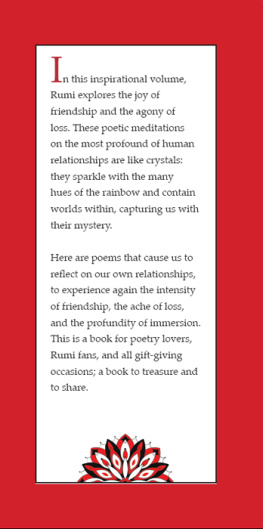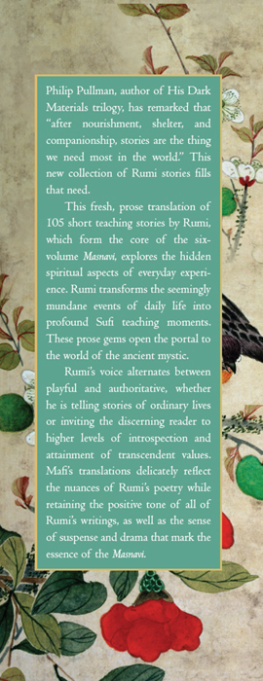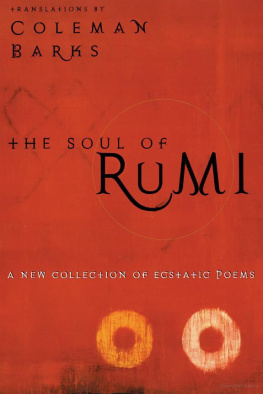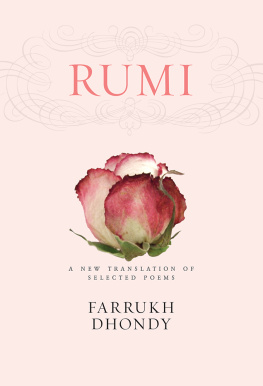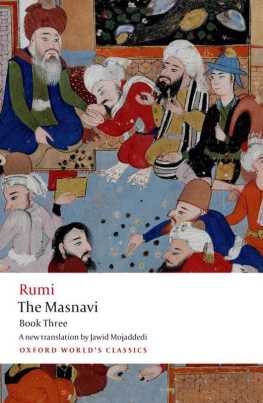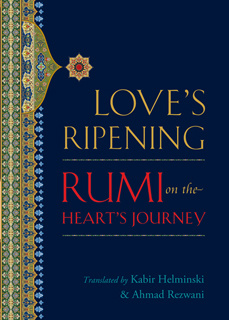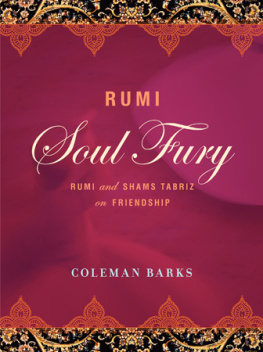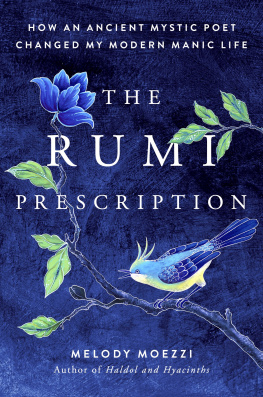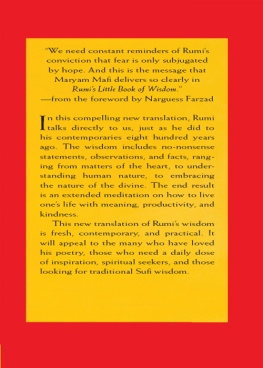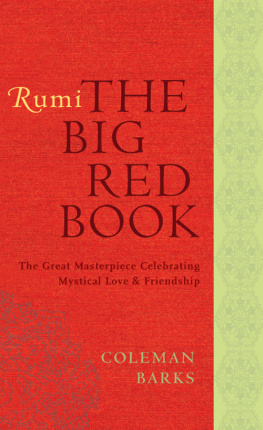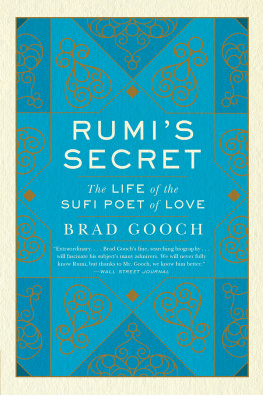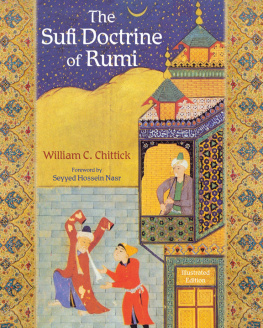Rumi - Rumis Little Book of the Heart
Here you can read online Rumi - Rumis Little Book of the Heart full text of the book (entire story) in english for free. Download pdf and epub, get meaning, cover and reviews about this ebook. publisher: Hampton Roads Publishing, genre: Art. Description of the work, (preface) as well as reviews are available. Best literature library LitArk.com created for fans of good reading and offers a wide selection of genres:
Romance novel
Science fiction
Adventure
Detective
Science
History
Home and family
Prose
Art
Politics
Computer
Non-fiction
Religion
Business
Children
Humor
Choose a favorite category and find really read worthwhile books. Enjoy immersion in the world of imagination, feel the emotions of the characters or learn something new for yourself, make an fascinating discovery.
- Book:Rumis Little Book of the Heart
- Author:
- Publisher:Hampton Roads Publishing
- Genre:
- Rating:5 / 5
- Favourites:Add to favourites
- Your mark:
- 100
- 1
- 2
- 3
- 4
- 5
Rumis Little Book of the Heart: summary, description and annotation
We offer to read an annotation, description, summary or preface (depends on what the author of the book "Rumis Little Book of the Heart" wrote himself). If you haven't found the necessary information about the book — write in the comments, we will try to find it.
Rumi: author's other books
Who wrote Rumis Little Book of the Heart? Find out the surname, the name of the author of the book and a list of all author's works by series.
Rumis Little Book of the Heart — read online for free the complete book (whole text) full work
Below is the text of the book, divided by pages. System saving the place of the last page read, allows you to conveniently read the book "Rumis Little Book of the Heart" online for free, without having to search again every time where you left off. Put a bookmark, and you can go to the page where you finished reading at any time.
Font size:
Interval:
Bookmark:
 Copyright 2016 by Maryam Mafi and Azima Melita Kolin All rights reserved. No part of this publication may be reproduced or transmitted in any form or by any means, electronic or mechanical, including photocopying, recording, or by any information storage and retrieval system, without permission in writing from Red Wheel/Weiser, LLC. Reviewers may quote brief passages. [Previously published in 1999 as Rumi: Whispers of the Beloved by Thorsons, an imprint of HarperCollins Publishers, ISBN: 0 7225 3981 9. Cover design by Jim Warner Cover photograph Two Little Ink Birds, 2014, (ink on paper), Moniz Charalambous, Nancy / Private Collection / Bridgeman Images Typeset in Sabon Hampton Roads Publishing Company, Inc. Charlottesville, VA 22906 Distributed by Red Wheel/Weiser, LLC www.redwheelweiser.com Sign up for our newsletter and special offers by going to
Copyright 2016 by Maryam Mafi and Azima Melita Kolin All rights reserved. No part of this publication may be reproduced or transmitted in any form or by any means, electronic or mechanical, including photocopying, recording, or by any information storage and retrieval system, without permission in writing from Red Wheel/Weiser, LLC. Reviewers may quote brief passages. [Previously published in 1999 as Rumi: Whispers of the Beloved by Thorsons, an imprint of HarperCollins Publishers, ISBN: 0 7225 3981 9. Cover design by Jim Warner Cover photograph Two Little Ink Birds, 2014, (ink on paper), Moniz Charalambous, Nancy / Private Collection / Bridgeman Images Typeset in Sabon Hampton Roads Publishing Company, Inc. Charlottesville, VA 22906 Distributed by Red Wheel/Weiser, LLC www.redwheelweiser.com Sign up for our newsletter and special offers by going to
www.redwheelweiser.com/newsletter/.
ISBN: 978-1-57174-742-6 Library of Congress Control Number: 2016933568 Printed in Canada FR 10 9 8 7 6 5 4 3 2 1 www.redwheelweiser.com www.redwheelweiser.com/newsletter

His father, Baha-e Valad, is a renowned religious leader with a great following. A descendant of a long line of theologians, teachers, scholars and Islamic jurists, he eventually falls into disfavor with the brutal local ruler. Fearing the impending Mogul invasion, Rumi's father gathers his family and followers and leaves his homeland. After years of traveling during the mayhem of war and destruction they eventually arrive in Konya, in the province of Rum in present-day Turkey. Konya, melting pot of many cultures, religions and nationalities, is also a center of science, literature and learning. Rumi, now in his teens, is nourished in an atmosphere of love, stability and intellectual richness.
Meanwhile the Turkish leader of the province offers Baha-e Valad his own school and the family settles permanently in Konya. Years later, after his father's death, the young erudite Rumi assumes the teaching post in the same school, not only leading his father's students but gaining thousands more on his own merit. In 1244 Rumi, now thirty-six and an established scholar and religious leader, encounters Shams of Tabriz, a man in his sixties who is to shake the very foundations of Rumi's life. Shams' background is unclear, his appearance is shabby and his manner is rough and uncompromising. A dervish, or wandering mystic, Shams is a highly advanced Sufi walking the spiritual path of Love. Rumi recognizes in Shams a great master and, from their first encounter, becomes devoted to him.
The meeting of these two men is like the meeting of two mighty rivers. Highly accomplished spiritual beings, each man recognizes in the other the confidant he has been seeking. Shams, searching all his life for someone who can truly understand him and receive his knowledge, finally finds that person in Rumi. They spend hours secluded from others immersed in meditation and spiritual talk. Shams encourages Rumi to resign from teaching, discard all his beloved books and refuse to see any of his students and followers. Instead he takes him on the path to the Love of God through insight, music, dance, and ultimately, poetry.
This of course raises many eyebrows, and jealousies erupt among Rumi's dedicated followers. They regard Shams as a scruffy old man unworthy of the company of their master and who has distanced him from them. Eventually their petty behavior leaves Shams no option but to abandon the side of his adored friend without leaving a trace. Hearing the news Rumi goes into deep seclusion and refuses to see anyone. The pain of separation from his beloved friend provokes him to begin expressing his longing and his suffering in poetry for the first time. His devotees eventually become exasperated and admit that it is better to have Shams back than never to see Rumi again.
After months of searching Rumi finally receives a letter from Shams who is now in Damascus. Rumi sends his older son, Sultan Valad, and many followers to implore Shams to come back to Konya. The moment Rumi sees Shams' face again he regains his composure. They resume their discourse and immerse themselves in music and sema, a whirling spiritual dance. For a while Shams and Rumi are spared from the jealous eyes of the devotees. Rumi even manages to convince Shams to marry a young girl named Kimia, who is a member of Rumi's household.
Shams indeed falls in love with Kimia but it is not meant to be. Only a year later Kimia dies following sudden illness. Overwhelmed with grief, and his discontent with the behavior of people around Rumi, Shams disappears againthis time for good. There are different versions of what happens to Shams. Some say Rumi's followers, assisted by his younger son Allaedin, murder Shams and toss his body down a well. Others say Shams had realized the time for him to go had arrived and that if he stayed he would only curtail Rumi's spiritual growth.
No one can be certain. Perhaps it really does not matter. The truth is that Shams appears in Rumi's life at the right moment and turns an educated, intelligent religious leader into an enlightened being. He shines in Rumi's life like the sun that he is, and disappears just as suddenly as he walked into it. Rumi and Shams spend a total of two years together, after which Rumi becomes the great mystic poet we know today. Streams of poetry pour through his lips in praise of Shams, of Higher Truth and of Love.
The agony of separation from his most beloved friend is overwhelming, as seen in his verse. Eventually, however, he realizes that the friend he is truly longing for is his own inner self, whom Shams had so clearly reflected. He becomes the sun that warms and transforms hearts, attracting people from all creeds, classes and religions. His funeral in 1273 is attended by thousands of mourning Moslems, Christians, Jews, Greeks, Arabs, Persians and Turks. Rumi calls death a wedding with eternity, and his words reach us through seven centuries: Do not weep over me... Do not say how sad...
To you my death may seem a setting... But really it is a dawn. What we have in our hands today of Rumi's journey, his struggles and his arrival is colossal volumes of teaching written in verse: the Divan e Kabir and the Massnavi. Rumi's Rubaiyat, the quatrains, consisting of 1659 verses, are much less known in the West. Many of the quatrains were set to music and sung in Sufi gatherings and sema performances. No one can precisely allocate them to specific periods of Rumi's life.
Some were written while Shams was still with Rumi, others poured from his lips after Shams was gone. Like crystals, they sparkle with rainbow colors and contain worlds inside. As we hold them in our hands, they capture us with their mystery. Transparent and clear they open doors to the wonder of inner spaces and longing. Traced in Persian calligraphy, Rumi's words are like writings on water, dancing and embracing our souls. They are the whispers of two lovers in a crowd.
Next pageFont size:
Interval:
Bookmark:
Similar books «Rumis Little Book of the Heart»
Look at similar books to Rumis Little Book of the Heart. We have selected literature similar in name and meaning in the hope of providing readers with more options to find new, interesting, not yet read works.
Discussion, reviews of the book Rumis Little Book of the Heart and just readers' own opinions. Leave your comments, write what you think about the work, its meaning or the main characters. Specify what exactly you liked and what you didn't like, and why you think so.

